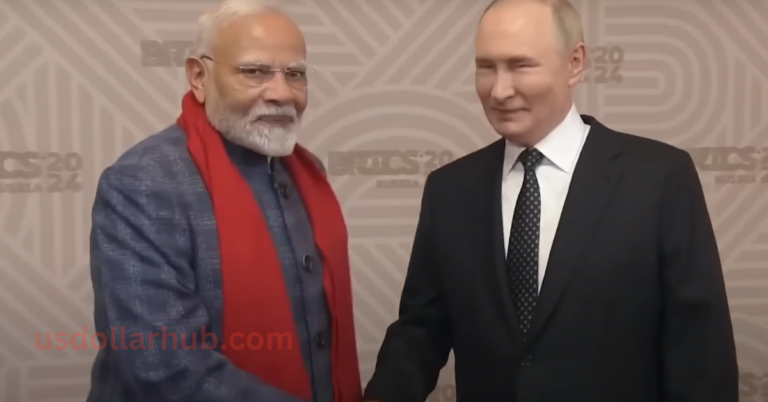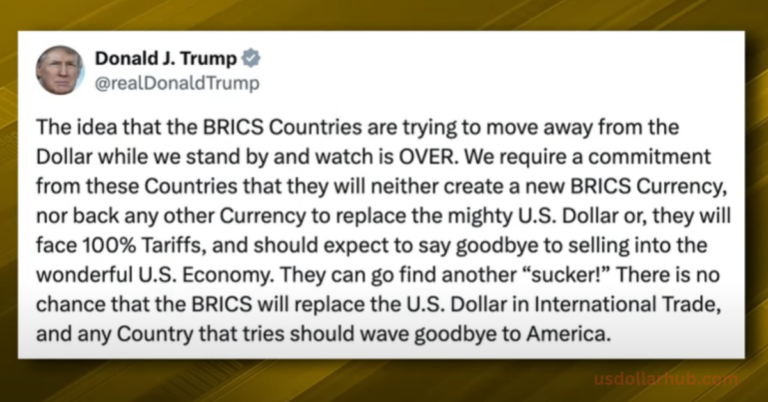BRICS Nations Challenge U.S. Dollar Dominance : De-dollarization Explained 2025
BRICS Nations Challenge U.S. Dollar Dominance
For decades, the U.S. dollar has reigned as the world’s dominant reserve currency, providing the U.S. with significant economic leverage. However, BRICS nations (Brazil, Russia, India, China, and South Africa) are spearheading efforts to reduce dependency on the dollar, reshaping the global financial landscape. This shift threatens to alter international trade, weaken the U.S.’s economic influence, and challenge its geopolitical dominance.

In this blog, we’ll delve into the implications of the declining dollar dominance, BRICS’ strategies, and their potential impact on the U.S. economy.
The Global Challenge to Dollar Dominance
Why the Dollar Reigned Supreme
The U.S. dollar’s dominance is rooted in its status as the world’s primary reserve currency, facilitating trade, stabilizing economies, and supporting global finance. Benefits include:
- Cheaper borrowing for the U.S.
- Enhanced ability to enforce economic sanctions.
This supremacy, however, is now under scrutiny as nations seek alternatives.
BRICS’ Strategies to Reduce Dollar Dependency
Local Currency Trade Agreements
BRICS nations are increasingly bypassing the dollar in favor of local currencies:
- China & Brazil: In early 2023, these nations signed a pact to use their native currencies (yuan and real) in bilateral trade, enhancing economic self-reliance.
- India & Russia: Following Western sanctions, they transitioned energy trade to rupees and rubles.
Alternative Payment Systems
Efforts to circumvent the dollar-dominated SWIFT network include:
- BRICS Pay: A decentralized payment system facilitating local currency transactions.
- Iran & Russia Collaboration: Integration of banking systems to support trade and reduce reliance on Western financial infrastructure.
Geopolitical Implications of a Declining Dollar
Impact on the U.S. Economy
A reduced global reliance on the dollar could lead to:
- Lower demand for U.S. Treasury securities.
- Increased borrowing costs.
- Reduced ability to impose financial sanctions.
Gold Reserves as Financial Stability
BRICS countries are bolstering their gold reserves, collectively holding over 6,200 tons (21.4% of global reserves) by mid-2024. This strategy strengthens financial independence and shields against economic sanctions.
Trump’s Warning to BRICS Nations
Trump’s Firm Stance
Former President Donald Trump has cautioned BRICS nations against challenging the dollar, threatening tariffs and economic penalties.
- Proposed actions include labeling nations as currency manipulators and imposing trade restrictions.
- His approach aims to preserve the dollar’s central role in global trade.
Global Reactions
Trump’s aggressive stance has heightened tensions, with allies and adversaries re-evaluating trade agreements and financial strategies.
The Future of Dollar Dominance
The efforts of BRICS nations signal a transformative phase in global finance. While the U.S. dollar remains dominant, its decline poses significant challenges to the global economic order and U.S. geopolitical influence. Policymakers must address these shifts to safeguard national interests.

FAQs:
Why is the U.S. dollar considered the global reserve currency?
The U.S. dollar’s stability, liquidity, and widespread use in trade and finance make it the preferred reserve currency for central banks worldwide.
What is BRICS Pay?
BRICS Pay is a decentralized payment system enabling transactions in local currencies among BRICS nations, reducing reliance on Western financial systems.
How does local currency trade benefit BRICS nations?
Using local currencies minimizes exchange rate risks, reduces transaction costs, and enhances financial independence.
Why is gold important for BRICS nations?
Gold serves as a hedge against economic sanctions and currency volatility, promoting monetary policy autonomy.
How does the U.S. benefit from dollar dominance?
Dollar dominance allows the U.S. to borrow cheaply, influence global trade, and impose effective financial sanctions.
What role does China play in BRICS’ financial strategy?
China leads efforts to de-dollarize trade, promoting the yuan as a global currency and signing local currency trade agreements with BRICS members.
How could a weaker dollar affect the U.S. economy?
A weaker dollar could lead to higher borrowing costs, reduced geopolitical influence, and challenges in imposing financial sanctions.
Why are BRICS nations diversifying reserves?
Diversification into gold and other currencies spreads financial risks and reduces dependency on the dollar.
What are Trump’s proposed tariffs on BRICS nations?
Trump has threatened tariffs and trade restrictions to deter BRICS nations from challenging the dollar’s dominance.
Can BRICS fully replace the dollar in global trade?
While challenging, BRICS efforts indicate a move towards a multi-polar financial system rather than complete replacement of the dollar.
Disclaimer:
This article is for informational purposes only and does not constitute financial or investment advice. Consult a professional advisor for guidance tailored to your financial situation. For more visit – UsDollarHub.com






